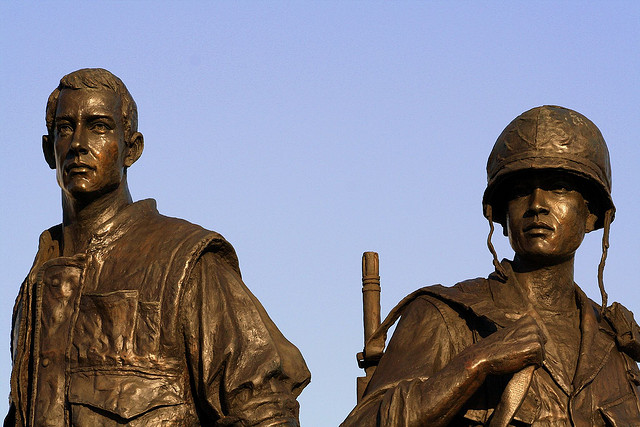
Unknown to many, 95 miles north of San Diego in the city of Westminster stands a memorial to the Vietnam War erected by the Vietnamese-American community. The centerpiece is a statue of two soldiers standing close to each other, South Vietnamese and American.
As we honor Veterans Day, we should remember that it was not just an American war but a non-communist Vietnamese one as well. They suffered many more casualties than we did and also lost their country.
Coincidentally, there is an ongoing Defense Department commemoration of the Vietnam War, which honors that war’s veterans, highlights the service of our Armed Forces and civilian contributing agencies and recognizes the contributions and sacrifices made by our allies.
From our Iraq and Afghanistan experience, the public has realized that we should honor our soldiers who risk their lives, even though we may not agree with the particular war itself.
This was not the case during Vietnam, when many returning veterans were either ill-treated or ignored.
Speaking for the nation, President Barack Obama put respect for them into words during Memorial Day 2011. Standing at the Vietnam Veterans Memorial in Washington in the presence of hundreds of veterans, military, civilian and allied, he said:
“As we observe the 50th anniversary of the Vietnam War, we reflect with solemn reverence upon the valor of a generation that served with honor. While no words will ever be worthy of their service, nor any honor befitting their sacrifice, let us remember it is never too late to pay tribute to the men and women who answered the call of duty with courage and valor. Throughout this commemoration, let us strive to live up to their example by showing our Vietnam veterans, their families, and all who have served the fullest respect and support of a grateful nation.”
As I think about being there at that moment, I remember so many of my own Vietnamese friends who died after the communists took over, who suffered but survived in concentration camps or who were among the million who took to the seas to escape oppression. On this Veterans Day, they need to be honored, too.
If my 14-year involvement in the effort to keep South Vietnam free tells me anything, it is that what has become a narrative of the South Vietnamese unwilling to fight for their own country needs to be changed. This was popularized by such books as “A Bright Shining Lie,” by Neil Sheehan. The non-communist Vietnamese were pictured as essentially cowardly and incompetent, with the Viet Cong shown to be 8 feet tall with the right cause on their side.
The fact is that after Tet in 1968, the South Vietnamese with our support managed to bring peace to almost all of the countryside, much of which had been controlled by the Viet Cong. Then in 1972, with our air support but no direct American troop involvement, they managed to defeat a massive North Vietnamese invasion, the Easter Offensive. Then in 1975, with our aid cut off and no effective air support, the country collapsed.
Was there too much corruption and too many incompetent leaders in South Vietnam? Absolutely. But this was also the case for many years in South Korea, where an all-out assault from the North was forestalled by a continuing American commitment.
Vietnam is worth revisiting because we need to extract the right lesson, not the wrong one. For too long in Vietnam, we thought we could defeat the North Vietnamese ourselves, then turn the country back to our Vietnamese allies.
This was never the case. Only the South Vietnamese could have prevailed. But to do so, they needed our understanding as well as steadfast support. By the time we realized how to fight the war in a supporting role, American public support had been lost.
As I told President John F. Kennedy at the White House in September 1963, the war was primarily a political, not a military struggle. This holds lessons for us from Iraq and from Afghanistan, as we scale back our involvement there.
One lesson is that helping other vulnerable countries with traditional societies develop a working democracy and overcome internal insurgencies is a lengthy process.
Another is that we have to start our involvement with the view that only the people of the country in question can win this kind of contest. We can’t do it for them.
It is unlikely we will need to intervene massively in the future, but we will still need to lean forward with a smaller but steady footprint of assistance. This needs to be explained, because the challenge is not going away.




